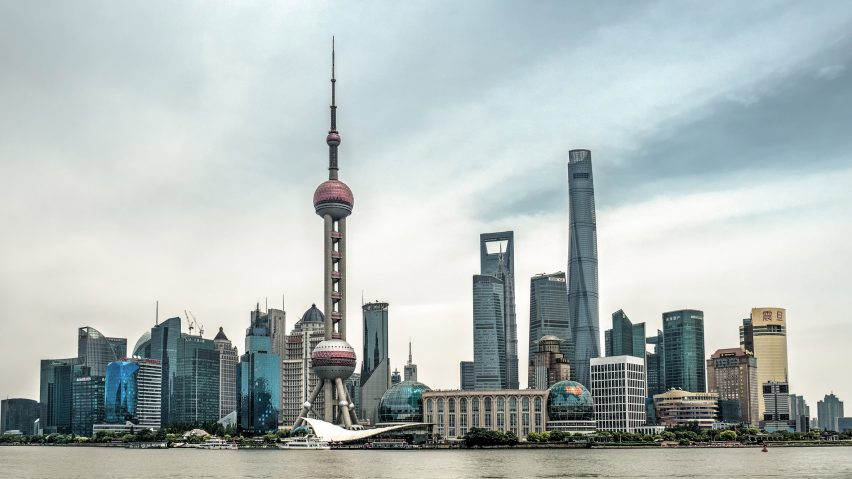Coronavirus lockdowns in major cities in China are impacting architecture projects, causing design fairs to be cancelled and triggering concerns over global supply chains.
With the country experiencing record levels of Covid cases, businesses in Shenzhen, Shanghai and other affected regions have had to close or switch to remote working.
Rossana Hu, co-founder of Shanghai architect Neri&Hu, said the situation has "worsened to a point that frankly no one knows where the trajectory will lead".
Restrictions are now more severe than during any previous wave of the pandemic, she said. "In Shanghai, it's the worst it's been, as many communities are under lockdown".
Events including the China International Furniture Fair Guangzhou, Shenzhen Creative Week and Shanghai Fashion Week have been cancelled.
"We cannot leave our residences"
"Our office building has been locked since last week and we are all working remotely from home," Shenzhen-based Italian architect Freddy Curiél told Dezeen. "We literally cannot leave our residences and compounds."
This is leading to project delays and "a short-term lack of confidence," Curiél said.
"We have noticed a number of clients who are unsure of the impact to schedules and invariably this has led to projects on hold or a delay in starting," added Curiél, who is the founder and creative director of Lapis Bureau.
"Fast-track commercial projects in pre-project investment stage could be affected due to a short-term lack of confidence while those in construction stage could be delayed due to workers' immobility or site lockdowns," said Christina Luk, founder and director of Luk Studio based in Shanghai.
"The retail sector has been particularly affected"
Soaring infection rates in China have led to restrictions affecting tens of millions of people across the country. Lockdowns are in place across the entire Jilin province in northeast of China and Shenzhen in the south.
Businesses in many of the affected regions have been told to close or have their employees work from home, unless they supply essential services like food, utilities or other necessities.
"The retail sector has been particularly affected by a reduction in tourism, and brands are not expanding as fast as before," said Chen Jin, co-founder of Slow Studio in Shanghai.
The southern city of Shenzhen, with over 17.5 million population, was placed in lockdown on 14 March, with all buses and subway services suspended for a week.
"I stay cautiously optimistic for the moment"
Shenzhen architecture studio Studio 10 said an exhibition project it was working on has been delayed.
"We were in the same position back in 2020 when we had two exhibition projects suspended," said Shi Zhou, founder of Studio 10.
"Long-term delays to projects would definitely affect our cash flow so we really hope the lockdown will not last too long" added Zhou, who was able to return to the office this week. "I stay cautiously optimistic for the moment."
As a major technology hub, Shenzhen is a key part of the global supply chain for consumer electronics. Foxconn, which manufactures iPhones for Apple, stopped its operations in Shenzhen on 14 March, saying the date of resumption would "be advised by the local government".
Shenzhen is also home to Yantian Port, the world's third-largest port. Shipping company Rohlig Logistics warned clients that, even though the port remains open, shipments were being delayed due the need for truck drivers to show negative Covid tests before starting their journeys.
Last May, a small Covid outbreak among workers at Yantian Port led to a month-long closure, which caused a supply chain backlog that took months to clear.
"If this goes on too long it would hurt our business"
The lockdown could impact the furniture sector too. Global Design Distribution (GDD), which operates over 30 international furniture brands in China including Established & Sons, Gufram and Zaha Hadid Design, said it has concerns.
"The lockdown definitely impacts our schedule of imports and domestic logistics. We could move our orders earlier to avoid potential delay, but at the end of the day, Covid lockdowns are mostly unpredictable," said GDD.
Shanghai, where GDD's head office is based, is undergoing similar restrictions. The local government has not forced residents to stay at home but has put a screening system in place, meaning that people have to show two negative tests within 48 hours before they can move around the city.
While trade shows and events are being cancelled, some designers and architects worry that the decreasing level of knowledge exchange within the industry, reducing competitiveness.
"If this goes on too long it would hurt our business in terms of developing new markets or new clients," said Yuchen Wang, associate partner at German architecture firm Henn's Beijing office.
The photography is by Ermell.
Dezeen is on WeChat!
Click here to read the Chinese version of this article on Dezeen's official WeChat account, where we publish daily architecture and design news and projects in Simplified Chinese.

